Interview With Cindy Rasicot
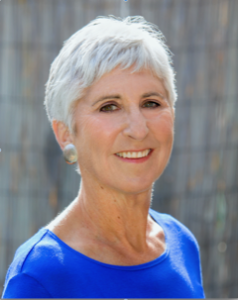 Cindy Rasicot led a pretty typical suburban life until her husband took a job in Thailand. It was not until she lived overseas and found her spiritual mentor the Venerable Dhammananda that she truly discovered how to feel at home–with herself. Cindy’s shares her unique and inspiring journey in her book Finding Venerable Mother. You can hear Cindy’s conversations with Dhammananda through her program Casual Buddhism, which you can access on her YouTube channel. I am so pleased Cindy shared her thoughts and experiences with our WomanPause community.
Cindy Rasicot led a pretty typical suburban life until her husband took a job in Thailand. It was not until she lived overseas and found her spiritual mentor the Venerable Dhammananda that she truly discovered how to feel at home–with herself. Cindy’s shares her unique and inspiring journey in her book Finding Venerable Mother. You can hear Cindy’s conversations with Dhammananda through her program Casual Buddhism, which you can access on her YouTube channel. I am so pleased Cindy shared her thoughts and experiences with our WomanPause community.
Diane: I really enjoyed reading your story. I love to hear about spiritual journeys, and I’m so grateful that you’re willing to share yours with us, so thank you. And before we get into the nuts and bolts of your steps along the way, I’m thinking of the Hero’s Journey steps that start out with the ordinary life, before you cross over the threshold.
Can you give us a sense of your ordinary life, the before?
Cindy: Well, I was a fundraiser for non-profits, and although I have a Marriage, Child, Family, Counseling license, I wasn’t doing that. I started counseling in the 1970s and I had stopped by 1980 and switched to fundraising in educational institutions and arts organizations in the mid 1980’s.
I was tired of my fundraising job when my then-husband got an offer to go to Thailand for three years on an expat assignment. I really wanted a change; I was about 53 at the time, my son was about 13. We were living in a suburb, and I was kind of bored with what was going on. I really didn’t consider myself a soccer mom. It seemed like a real opportunity to have an adventure. Both my husband and I wanted that, so that’s how we embarked on it.
“When a Student is Ready, the Teacher Will Appear”
Diane: That is exciting, unusual, and adventurous. We talk a lot about Feeling the Fear and Doing It Anyway. I don’t know if you know that oldie and fabulous book.
Cindy: Yes.
Diane: So, right then and there, we know you have some courage because not everyone would get up and leave their home and go to Thailand.
Cindy: Right.
Diane: How did you connect with your future spiritual teacher and mentor?
Cindy: Well, as I like to say it, I didn’t go intending to have a spiritual adventure. It happened to me.
I heard it said that when a student is ready, the teacher will appear. And that’s what happened to me after we had moved. We were living in a rental property in a compound in an expat community near Bangkok. And I was looking for something meaningful to do.
I thought about working for orphanages, which is quite common for ex-pat women because there are quite a few orphanages and babies up for adoption in Thailand. I’m not sure that’s the case now, but it was the case then. Volunteering for my son’s school was another option.
I’ve always been interested in women’s issues and women’s organizations, and I had interviewed at the Global Fund for Women before I left for Bangkok. It’s in San Francisco, and it funds micro-enterprise in mostly impoverished countries throughout the world. A lot of them in Africa, I believe. I looked on their website, not having anything specific in mind, and they were having a conference in Bangkok in October 2005.
“It Was Like an Electric Shock Went Through Me”
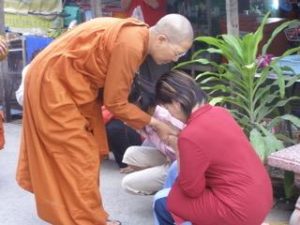 I looked at the workshop schedule for the day, and the afternoon workshop that interested me was called Faith, Feminism and the Power of Love. Now, that was an interesting juxtaposition—having spirituality and politics in the same breath. Venerable Dhammananda was there representing Thailand. There were nine panelists from all over the world.
I looked at the workshop schedule for the day, and the afternoon workshop that interested me was called Faith, Feminism and the Power of Love. Now, that was an interesting juxtaposition—having spirituality and politics in the same breath. Venerable Dhammananda was there representing Thailand. There were nine panelists from all over the world.
There was a conversation happening between two Muslim women from two different countries and they had opposing opinions about how Islam affected the lives of poor women.
They had a disagreement, and there was a huge silence in the room after the conversation ended. Into that silence stepped Venerable Dhammananda. I didn’t know who she was at the time. I just saw a tall, Thai woman with a shaved head, saffron robes, flip-flops, and wire-rimmed glasses speak up and say, “We cannot solve anything with anger. Anger doesn’t lead us anywhere. It is much harder to practice loving kindness and compassion. That is the goal of Buddhism.”
It was like an electric shock went through me—something important was happening. I was very moved by what she said, probably because I had struggled with anger and issues of rage towards my parents in my childhood. I struggled with anger in my heart. She said quite casually at the end of the panel, “Anyone who wants to come and visit, please come down to my temple.”
I was at the conference with a woman I met. We approached Venerable, she pulled out a business card from her satchel and said, “Here’s where you come. Call me if you have questions.” And of course, we were on our way that very weekend.
“I Felt a Kind of Spiritual Elevation, Like I Was Being Taken into a Higher Place within Myself”
Diane: What was if like when you met with her at the temple?
Cindy: It was very beautiful. There was a lot of chanting in an ancient language called Pali, which I didn’t understand, but when I sat with the other women nuns, I felt a kind of spiritual elevation, just like I was being taken into a higher place within myself. The chants are very beautiful, and the music is very beautiful, so you kind of get carried away in a stream of their voices.
And then the alms round, which is when the nuns and monks (essentially Dhammananda is considered a female monk) go out and receive food and rice from the local people. The schedule is based on the calendar for the full moon and the waning moon. They do alms round once during the week and always on Sundays. I went on the Sunday alms round and that is very moving.
Thailand is a Buddhist country, and Thai people really revere their monks and nuns. I watched the people look to her with love in their eyes. It was very moving to see poor people giving fresh food, people who obviously didn’t have a lot to give but gave what they could.
“How I Felt About It At the Time Was Probably Not As Clear to Me Then as When I Look Back on It in Writing”
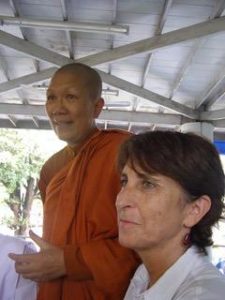 Diane: When you’re in a relationship and one person or both start to grow in different directions, things change. You can either work that out or not.
Diane: When you’re in a relationship and one person or both start to grow in different directions, things change. You can either work that out or not.
It felt like you were connecting to Dhammananda and to yourself in a way that was making you see things you may not have consciously noticed before in your relationship with your husband. What was going on for you in your thoughts, in your heart?
Cindy: You’re quite right about growing in a new direction. My then-husband and I—we’re still very close because we still love each other—but we kind of split apart like a bifurcating plan. We sort of went different directions.
How I felt about it at the time was probably not as clear to me then as when I look back on it in writing, and that’s the beauty of writing a memoir. It’s a healing process that you go through, the writing itself helped me gain clarity on the process that happened, how it happened, when it happened, things that I didn’t necessarily realize at the time. We spent three years in Thailand from 2005 to 2008, and I didn’t initiate separation until 2018.
Diane: Interesting, because one of my questions was going to be, “Are you still married?” After reading the book, it didn’t feel like you were.
I think people write memoir to figure out stuff from the past, make sense of it.
Cindy: That’s part of it. I think people have a desire to tell their story and make it known, partly to themselves and partly to others.
It’s a dual process.
Diane: And a dual gift.
Cindy: Yes.
“The Back Is Like the Scaffolding of One’s Self”
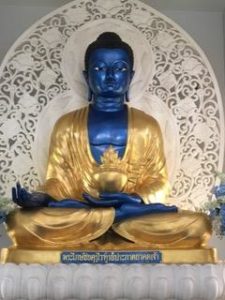 Diane: Talk about your back, because you had major back pain. and then there’s the Medicine Buddha. I feel like your back provided a turning point.
Diane: Talk about your back, because you had major back pain. and then there’s the Medicine Buddha. I feel like your back provided a turning point.
Cindy: I think, when we evolve, when we transform on a spiritual journey, it happens on a physical, emotional, and spiritual level. You might even say intellectual level, but that’s not where the heart is. The heart is in the … mind-body connection.
I’m kind of a deep-sea diver. For me to completely heal from the past traumas and difficulties with my mother, the pain and the trauma manifested on a physical level in my back. I was carrying the wounds of my childhood there.
Nothing was planned out or conscious, but as I proceeded to heal my back, there were, simultaneously, other things going on in me emotionally. Certainly, when we heal something so severe as back pain, it helps us on our journey to fulfillment and wholeness. And the back is like the scaffolding of one’s self—the very essence of where change was happening within my self-support system, my self-acceptance, and the way I was going to care for myself and heal from those early wounds.
Diane: That’s beautiful.
Cindy: I should say that the Medicine Buddha was essential in my healing because I began praying and meditating to the Medicine Buddha after that first trip when I came back from the temple, and it continued on through the duration of my back surgery and recovery process.
“I Still Interview Her Every Other Week on a Program Called Casual Buddhism”
Diane: You kept making visits to the temple, and part of it was to interview Venerable Dhammananda for an article you were writing.
Cindy: Well, in the beginning, writing was kind of an excuse to get back together with Venerable Dhammananda. Over time we developed a really close relationship. The more I interviewed her, the more she was leading me as a student and teaching me. She’s 77 now. I still interview her every other week on a program called Casual Buddhism. She has a lot of wisdom and compassion that she shares so it’s quite beautiful to sit with her and to receive her teachings.
Diane: She embodies how a woman can be fierce and gentle at the same time.
Cindy: Definitely!
Diane: She’s a feminist to the core.
Cindy: Oh yeah.
Diane: Can you just say a little bit about her, so we can understand who your teacher is.
Cindy: Sure. Basically, she was the first Thai woman to be ordained in the Theravada Buddhist tradition. At the time she ordained, there were 300,000 male monks and no ordained women. Thailand has a law since 1928 that stated a male monk cannot ordain a woman. That law is still in effect today.
Why is she so phenomenal? First because she was the first woman to step forward and do this. She laid the path for others to follow. Now there are approximately 300 ordained women in Thailand.
Diane: She got a lot of pushback.
“The BBC Named Her As One of 100 Most Influential and Important Women in the World”
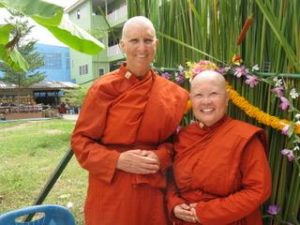 Cindy: She got a lot of pushback and criticism. She didn’t read the newspaper for two years because they were saying such negative things about her.
Cindy: She got a lot of pushback and criticism. She didn’t read the newspaper for two years because they were saying such negative things about her.
She was married for 30 years, had three grown sons at the time she chose to ordain. Her sons were fully grown so she felt okay about leaving them. And in 2019, the BBC named her on the list as one of 100 most influential and important women in the world.
You can see her stature within the community of early feminist nuns. There was Tenzin Palmo, who’s the Tibetan woman who lived in a cave for 13 years in India. There’s Roshi Joan Halifax, who has Upaya Center in Santa Fe and was ordained about the same time within the Zen tradition. These women were pioneers, and the interesting thing about Dhammananda is that she is this striking combination of what Roshi Joan Halifax calls a soft front and strong back.
She can be incredibly compassionate, but she also has fierce determination and a stern side. That role model of femininity was not something I was familiar with. I was familiar with the stern side, the judgmental, the critical side, because that’s how my mother treated me. I never experienced the unconditional love and kindness from a woman who was also strong and determined.
Diane: I thought of your book as a coming-of-age story.
When we think of coming-of-age stories, we think of teenagers or people in their young 20s, but I think many women of our age in our culture didn’t have the opportunity to come of age until much later.
“All I Could Think About Was Losing My Hair”
Cindy: Oh, absolutely. I was always in a place of blaming others and felt victimized until the time I was ordained and began to feel gratitude and forgiveness. I transitioned from being angry and blaming others to accepting myself, and taking on adult responsibility. I would say I’m a late bloomer.
Diane: It’s an identity story.
Cindy: It’s an identity story.
Diane: Which is fascinating. Tell us about the ordination and how you decided to become ordained.
Cindy: Again, it was one of those things I didn’t consciously think about. I visited Venerable in January 2014 because I just wanted to see her again and was missing her … I also look at the temple as a place of sanctuary, my true home.
Diane: After your husband’s position ended there, you came back to the States. You had gained a lot and grew a great deal, but it kind of dissipated because you didn’t have Dhammananda’s support.
Cindy: Yes, because I fell into my old role. I didn’t have the chance to explore some of that depth work that I had been doing in Thailand.
In early January of 2014, I visited the temple for about 4-5 days. And on the ride to the airport, I shared a taxi with a young woman who was going to return to the temple in two weeks to be ordained. I remember sitting on the taxi and seeing her long black hair, and I thought, “How could she shave off all her hair? ” I know that’s not what ordination is really about, it’s about taking the precepts and making a commitment to the monastic life. But all I could think about was losing my hair.
“It Was the Transformational Experience of My Life”
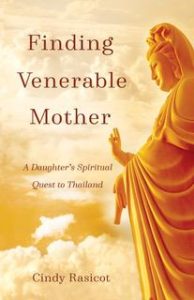 Anyway, at that point, I was very drawn to making a commitment to my teacher, and one of the ways you can choose to make a commitment is by going through what’s called temporary ordination. It’s a two-to-three-week process of going through the ceremonies and shaving your head as a commitment to your work in the Buddhist path and wearing the robes. It really felt authentic to me. It really felt wonderful.
Anyway, at that point, I was very drawn to making a commitment to my teacher, and one of the ways you can choose to make a commitment is by going through what’s called temporary ordination. It’s a two-to-three-week process of going through the ceremonies and shaving your head as a commitment to your work in the Buddhist path and wearing the robes. It really felt authentic to me. It really felt wonderful.
The decision was not so much that I was making a deep religious commitment to Buddhism. I did it for my teacher who was turning 70, and she was celebrating her appointment as a Pavatini. I wanted to celebrate that with her.
Right then in the taxi cab I decided that I wanted to ordain—I made a commitment and decided I want to go back in December and do that.
Diane: You talked about getting your head shaved in the book. What was that like?
Cindy: It was the transformational experience of my life really.
I can’t describe it other than it was a heart-opening, a deep heart-opening.
I felt the sense of joy that I’ve never felt in my life. It was very powerful joy, and I was no longer afraid of losing my hair.
Diane: The book is called Finding Venerable Mother: A Daughter’s Spiritual Quest to Thailand.
Why “a daughter’s”?
“The Depth of Relationship Was So Deep That I Was Able to Make a Huge Personal Change Through My Trust of Her”
Cindy: Venerable talks about the mother-daughter relationship as the most important relationship a woman can heal in her life. It’s the basis of our identity. I had a damaged relationship with my mother, and therefore had a damaged relationship with myself. What I found in Venerable Dhammananda was a spiritual mother, who fulfilled my needs as a daughter for healing, love, acceptance, forgiveness, which I couldn’t find in my own mother. You alluded to … not the Odyssey but the …
Diane: Hero’s Journey.
Cindy: Heroine’s Journey.
Diane: Shero’s Journey.
Cindy: Shero’s Journey.
I became very close to Dhammananda over time. Her name in Thai is Luang Mae which means Venerable Mother. That’s how she’s known.
When she was ordained, her son said that he really missed his mother because ordained women cannot hug a male adult. She told her son, “Now I am mother to the community,” the sangha, the women that are ordained living in her temple with her. The word Luang Mae, Venerable Mother, takes on a different meaning.
Diane: She was a teacher to you but in a very maternal way.
Cindy: Yes. Definitely. The depth of relationship was so deep that I was able to make a huge personal change through my trust of her.
Diane: What does Buddhism look like to you today?
Cindy: Well, I’m a practicing Buddhist. In some ways, I did it backwards. I was ordained before I really understood the heart of the Buddha’s teachings. Now, years later, I’m studying Buddhism. I meditate every day and go on a couple of retreats every year. I want to understand Buddhism because I really believe it’s helped me in my life.
I’m much more of a conscious and serious practitioner now than I was when I lived in Thailand.
“How Do You Approach the Question of Forgiveness?”
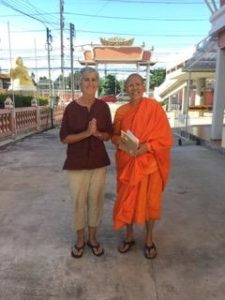 Diane: Did you find a temple that you connect to here?
Diane: Did you find a temple that you connect to here?
Cindy: I found a couple of teachers that I connect to. I have a meditation group. I still regard Venerable Dhammananda as my primary teacher.
Diane: What made you decide to write this story?
Cindy: I have story to tell, and I felt it was important to tell it. I wanted to become empowered by developing my voice and telling my story.
Diane: Tell us a little bit about your website.
Cindy: Basically, my website has all the information on the book; it has information on Venerable Dhammananda, who she is, a little bit about her history, who I am. I’ve also started this new program called Casual Buddhism that I think is so important. Casual Buddhism gives us an informal platform to talk about how Buddhism relates to everyday issues. You don’t have to be a Buddhist to understand Dhammananda.
We talk about things like, “My friend got very angry with me in a parking lot after a tire blew up.” How do you deal with it? “Another friend of mine, who I got really angry with because she had an opposing political opinion from me.” How do you deal with it?
The last episode was quite serious. It was about a friend who had been sexually molested by her father when she was three, and for years, she wasn’t able to forgive him. How do you approach the question of forgiveness? And essentially, what Venerable said was, “First, you have to forgive and love yourself.” She never even made it to answering the question of forgiving her father.
It’s a very powerful dialogue. There are so many women who have been affected by sexual abuse.
“Express Yourself … Don’t Be Afraid to Speak. Don’t Be Silenced into Submission”
Diane: Oh, totally.
This book also is about women’s power
Cindy: Oh definitely.
Diane: Before we close, what would you like to say to women 50 and older?
Cindy: Be brave, take a chance, find a way to use your voice. Not necessarily through writing, but in the life you have chosen. Express yourself. Become fully yourself, don’t be afraid to speak, don’t be silenced into submission.
Diane: Wonderful advice. Sharing your voice, having the courage to share your voice is… I think it’s certainly a women’s issue.
And even knowing what that voice is, right?
Cindy: Oh yeah.
And finding it.
Diane: Finding it and then celebrating it and sharing it with whomever will listen.
Cindy: As we’re doing with these beautiful messages of sharing that you’re giving.
Diane: Thank you. It’s such a joy, and this has been such a joy.
Cindy: Oh, thank you so much for having me.
You can follow Cindy on social: Facebook: @cindy.rasicot.author; Instagram: @cindy.rasicot. You can also learn more about Cindy at her website
As Always, I’d love to hear your thoughts. Please leave a comment or send an email.
See you August 16st!
XOXO
Diane

Please Feel Free To Share On Social Media.
And If You Know Another Amazing Woman (Or Person Of Any Gender!) Who Might Like To Join Us At WomanPause, Please Forward This Link: WomanPause
P.S. If you are inspired by wonderful writing, I’d love for you to join me on September 13, 20 and 27 for “Mirroring the Masters,” a writing class I am offering through the New York Writing Room.
*** Details and sign up here***



Great interview!! Thank you!
Thank you, Jocelyn!!
Loved this interview and Cindy’s book, too. Her many insights resonate, and this one, especially now, for women everywhere: “Don’t be silenced into submission.”
Thank you, Diane and Cindy!
Thank you, Jessica! Powerful words of advice from Cindy!
Everytime I read this blog I cry! This really hit me, squarely between the eyes today! “Be brave, take a chance, find a way to use your voice. Not necessarily through writing, but in the life you have chosen. Express yourself. Become fully yourself, don’t be afraid to speak, don’t be silenced into submission.”
As usual, Diane! You are a true delight and a connector of people! I sure miss your positive physical presence!
xoxox
Janet
Aww, Janet, that one got me too!
And I miss you, dear friend.
XOXOXO
Such a fascinating story! The following sentiments stayed with me:
“she…discovered how to feel at home–with herself.”
” I felt a kind of spiritual elevation, just like I was being taken into a higher place within myself.”
Thank you, Diane 🙂
Thanks, Sarita! I was captivated by Cindy’s story too!
What a wonderful inspiring interview! I listened to one of the interviews on Casual Buddhism and loved it! Will be listening to more and reading memoir! Thanks for being so brave & creative!
So glad you listened to Casual Buddhism! Cindy is quite the inspiration!
Diane and Cindy, this is a wonderful, compelling interview. It’s given me heart energy for my day and my own writing. A She Writes sister.
Thank you, Marlena! YAY for heart energy!!